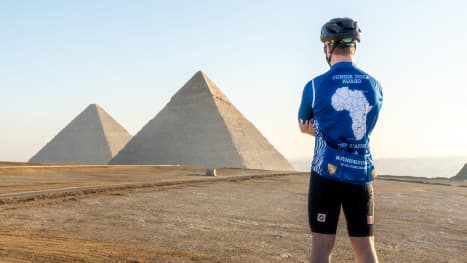Blog
Egypt’s Unknown Language – Honking
Benjamin Levin is the Content Creator on the 2024 Tour d’Afrique Cycling Expedition. In his second report, he looks back at his experience with Egyptian traffic and the different ways people use horns, something that our cyclists slowly learned about during their time in the country.
Arriving in any unfamiliar country can be overwhelming. For the riders beginning the Tour d’Afrique in Cairo, Egypt, with its constant and overwhelming stimulations, the experience is often a shock to the system. A thousand new sights, smells, and sounds welcome you to this great city. Through it all, no sense is as affected as is your hearing. Twenty-two million people live in the Cairo metro area and with an estimated 2.6 million licensed vehicles on the road, one sound rises above the din, honking. While the barrage of horns is often mistaken for constant anger on the road, it is really a nuanced language. Known only to the drivers of Egypt, the language of honking is as important for road literacy as reading street signs.
Many travellers to Egypt, hailing from countries where drivers tend to use horns to express anger or signal danger on the road, may find the constant deluge unsettling if they are not accustomed to it. Before acclimatizing to the honking culture, it would be easy to perceive everyone as constantly angry or in danger, putting you on edge. However, this conclusion would be misplaced. Spend any amount of time in the back of a taxi in Cairo, and you will begin to grasp the complex conversations that unfold on the matrix of streets, in the alleys, and throughout the 14-lane motorways of the city.

Yasser smiling as he chats about Egyptian drivers
As Yasser Mohamad, a Cairo native and a local bicycle mechanic in Egypt who was with us till Aswan to help support the clients, and I were driving, he explained the language of the road. “We have many words we can contact each other with [while driving], like ‘beep’ is like thank you, ‘beep beeeeep’ is like I’m angry from you, beep beep beep beep beep beep is like I love you habibi… some things like this,” he exclaims, laughing. This was just moments after he had honked at a car, passed it as it was honking back at him, then honked again to let them know his thanks. In just a few moments the two drivers communicated that one would pass the other, that it was ok, and then said thank you. All with a few touches of the horn. Yasser remarked that honking is part of everyday life in Egypt and makes driving much safer. “Without this, we would have many accidents on the road.” Lacking the traditionally enforced rules of the road, driving anywhere in Egypt is quite hectic and the use of the horns is a way to stay safe and aware on the busy streets.
Consider honking simply a form of social interaction; the same way that two people would make eye contact and nod to each other, is the same way two drivers honk. It makes sense. Polite people say please and thank you and ask for permission before doing something that may get in the way of others, but in a car we do not have the ability to speak this easily. Horns give people on the road a voice, a voice that people in many countries seldom use.
In Egypt, honking adds a layer of cultural richness to the chaotic song played on every Egyptian street. If you ever have the time to visit, take a moment to listen to the din of cars and trucks. Watch the skillful drivers weave in and out, taking cues from other drivers’ horns. You may just end up appreciating a sound you have been conditioned to dislike.
RELATED
TOUR

Tour d'Afrique
Our original trans-continental journey and flagship expedition crosses Africa from north to south, covering 10 countries in all. Beginning at the...
 REGISTER NOW
REGISTER NOW




Leave a Comment for "Egypt’s Unknown Language – Honking"